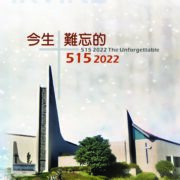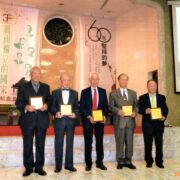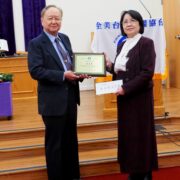The Path of Grace – 50th Anniversary of FPCLA
By Phoebe Chiu, Philip Lee, Translated by Philip Lee
Formosan Presbyterian Church in Los Angeles (FPCLA) is located near the intersection of Olympic Boulevard and La Brea Avenue in Los Angeles. The lofted roof of the church building is prominently visible on the north side of the street where it has stood for more than 50 years.
Now-a-days it is rare to see the term “Formosan” being used for identifying people from Taiwan. This is because it was a term used back in the 1960’s and 1970’s, which gave us a clue as to the era in which the church was founded and the country of its origin. Indeed, FPCLA is one of the oldest Taiwanese speaking churches in America founded by Taiwanese immigrants who still retained a strong cultural and ethnic identity with Taiwan to this day.
FPCLA, also known as Olympic Church, officially became a church on May 20, 1973. It was the first Taiwanese speaking church recognized by Presbyterian Church USA (PCUSA). Being a national Christian organization and a mainstream denomination, PCUSA followed a rigorous set of procedures for officially recognizing a worshipping body before accepting it as a member. FPCLA spent three years under the supervision of New Church Development Committee before officially becoming a part of PCUSA. From the first gathering (August 1970), FPCLA took the necessary steps to complete the development process, namely: establishing church organization and by-laws, seek approval from PCUSA for new church development oversight (May 1971), developing mission plans for the church, and hiring the first organizing pastor (September 1971). The founding members worked tirelessly to reach these milestones with a strong calling to proclaim the Gospel and fulfill the missions of Taiwanese American Christians. In 1970, Rev. Rei-Hsiung Chang (張瑞雄牧師), who was serving in a Methodist church in Fresno, California, saw that there was no Taiwanese church in the greater Los Angeles area. So, he decided to plant a new church there. The first worship gathering was held on August 9, 1970 at Centenary United Methodist church on Normandy Avenue and 35th Street, marking it the historical start date of FPCLA. Those who have actively supported and participated in the new church development included Dr. Daniel Kao (高光民), Dr. Chiao-Chiung Chen (陳昭俊), Dr. Si-Ya Yeh(葉思雅), Dr. Chung-Pai Lee (李宗派), Wen-Bin Hsu (許文彬), Chun-Hsiung Wong (王春雄), Chen-Yen Wu (吳政彥), and Hsing-Hsiung Lai (賴信雄).
FPCLA members were very sentimental about their present-day church building because they have held services there since July 1971. At the time, the church building belonged to Wilshire Crest Presbyterian Church, an Anglo-American church who had invited the Taiwanese congregation to share their facilities. By God’s providence, the presbytery decided to transfer the use of the church facilities to FPCLA in 1974 because Wilshire Crest had applied for closure.
Having a church building to themselves was nice but their good fortune did not last long. In the early morning hours of April 1, 1982, the church building was set on fire by an arsonist. The fire department dispatched eight fire trucks to the rescue. Despite their gallant efforts the church building was destroyed beyond recognition. After the fire, FPCLA members faced a critical challenge: not only they had to deal with the monumental task of rebuilding the church, they did not even know where to hold the next Sunday service. Through the assistance of Presbytery of the Pacific, FPCLA was able to secure the use of one of the chapels at Immanuel Presbyterian Church. It was the temporary home for FPCLA from April 25, 1982 to February 3, 1985, a span of two years and ten months it took for the reconstruct to complete. FPCLA members’ faith remained steadfast through the test of fire. Their conviction to proclaim the Gospel was stronger than ever because they went through the experience of “building character and producing perseverance through trial”. They experienced a deeper understanding of the spiritual significance of the Bible passage that described what Mosses saw on Mount Horeb – a bush that was burning but not consumed. “Burning but not consumed” thus became a powerful motto for FPCLA in the decades that followed.
The Lord’s blessing did not end with the completion of church reconstruction as FPCLA was able to purchase the building from the Presbytery in May 1991 and held a church building dedication service on June 7, 1991. By owning the church building, the concept of spiritual family became a physical reality. It was the strong sense of belonging that bonded the members together and solidified their love and support for FPCLA throughout the decades.
In September 1971, FPCLA called Rev. Chao Long Kao (高昭龍牧師)to be their first pastor. Because FPCLA was still under the supervision of the Presbytery, Rev. Kao served with the title of Organizing Pastor. In August 1972, Rev. Kao decided to quit his post and return to Harvard to continue his work there. FPCLA then called Rev. Jin-Ming Hsu (許錦銘牧師) to take up the post of Organizing Pastor. He was eventually ordained as the Senior Pastor of FPCLA in the following year.
The names of FPCLA senior pastors throughout the years are shown below:
1973-1979 Rev. Jin-Ming Hsu 許錦銘牧師
1981-1987 Rev. Hue-Hsiung Wen 溫惠雄牧師
1998-1991 Rev. I-Ming Tanng 陳黃義敏牧師
1993-2003 Rev. Wu-Fu Sun 孫武夫牧師
2009-2011 Rev. Sen-Yuen Su 蘇森源牧師
2014-2019 Rev. Jen-Hao Lee 李仁豪牧師
The following individuals also served in an assisting or interim capacity for pastoral ministries such as preaching and Christian education:
1980 Rev. Teh-Li Huang 黃德利牧師
1992 Rev. Teh-Rong Wu 吳德榮牧師
2013 -2014 Mr. Yun-Jeh Hsu 許惲哲傳道
FPCLA church membership at the time of its founding consisted of 37 adult Christians, 43 seekers, and 33 children. In the 80’s the church grew to 250 members strong. FPCLA experienced rapid growth during that period and saw opportunities to branch out to other communities in Southern California. FPCLA provided the impetus for establishing new churches in two locations: Orange County in 1976, and South Bay in 1988, respectively. However, right after the turn of the millennium, the number of immigrants from Taiwan began to dwindle and FPCLA’s membership declined perspicaciously. Currently, the membership numbers were down to about 70 adults and 20 youths and children, less than one half of the numbers from their peaks.
FPCLA’s pastors throughout the years have brought their gifts and skills to the ministries and touched the lives of many members. For example, Rev. Jin-Ming Hsu was good in writing. He produced many church fliers which were disseminated to the public in order to bring people to Christ. Rev. Hue-Hsiung Wen was proactive in member visitations. He was instrumental in helping recent immigrants assimilating to their new lives in the United States. Rev. I-Ming Tanng was well versed in English, which had served the church well in establishing communication with the Presbytery and other governing bodies. Rev. Wu-Fu Sun had many years of experience serving as the Moderator for the General Assembly of Presbyterian Church in Taiwan. He excelled in interpreting the by-laws, developing church organizations, and delegating tasks and responsibilities. Rev. Sen-Yuen Su had been influential in assisting young members in faith formation and spiritual growth. Rev. Jen-Hao Lee had produced excellent materials for daily Bible reading and devotionals. He also contributed significantly to the music programs. These were just a few examples of the contributions that the pastors have made to FPCLA.
Among Asian Christians, the Koreans were known to be vigilant prayers. Hence, Korean churches were also known as the “praying church”. Likewise, Taiwanese churches could be called the “music church” because of their emphasis on church music programs. FPCLA can be classified as such type of church because of the abundance of music talents among its members. Over the years, FPCLA has produced several well-known praise and worship teams, choirs, orchestras, hand-bell choirs, vocalists, instrument performers, and composers/arrangers. However, through the passage of time, the church saw a diminishing number of talents due to relocation, repatriation, and passing on. Many still reminisced the variety and richness of the worship experiences made possible by the enthusiastic participations of those individuals in the music ministries.
The worship style of FPCLA was distinctively traditional, suitable for a more matured audience. One may notice quite a few grey-haired individuals sitting in the pews on any given Sunday services. They who used to be young and energetic immigrants and overseas students have now become senior citizens. To keep up with the changing times, FPCLA offered ministries for the Mandarin speaking group and English-speaking group. It is amazing to see that in this little church three different languages were being used for Sunday services.
The young-adult’s ministry at FCPLA has been around for a long time. The church was located half-way between two major universities in Los Angeles where it made sense to reach-out to the overseas students from Taiwan. Mandarin was the primary language for this group because Mandarin has become the predominant language spoken in Taiwan in recent years. From 2013, FPCLA adopted a more autonomous approach to their Mandarin ministry. The young adult group had been given quite a lot of autonomy in their programming; they now conduct worship services and holds regular weekly gatherings apart from the Taiwanese group. The pastor and the church elders took up the responsibility for delivering sermons and Christian education programs in Mandarin.
There were about 20 people in the English-speaking group where Rev. William Lew led and supervised. Judging from their age (mostly teenagers) they looked more like the third-generation offspring of the Taiwanese congregation rather than the second generation. FPCLA’s English-speaking congregation saw their hay days between 1998 and 2002 where the average attendance reached 40 people. Their tithe and offering accounted for more than a quarter of the church’s total. They had to alternate the use of the main sanctuary with the Taiwanese group during Sunday services because of their increasing numbers. Their worship style was distinctively contemporary, which was carried out with lots of energy and enthusiasm.
In the 1990’s the English-speaking congregation consisted mostly of the second-generation offspring of the Taiwanese group. Many of them were of college age or recent college graduates. The church leaders realized that their spiritual needs could no longer be met with youth ministry. In July of 1998 FPCLA decided to call Rev. William Lew to serve as the pastor for the English-speaking group. Under Rev. Lew’s leadership, the English-speaking group began to grow steadily as the church provided Christian education and leadership training programs for the English-speaking members. The expansion of the English-speaking group had created a “one church two congregations” structure. FPCLA experienced many breakthroughs during this period. For example, they had their first English-speaking pastor, the first English-speaking deacon/elder, English-based join Sunday services, and mixed traditional and contemporary worship events. The English-speaking members began to serve in various committees and programs in the church. This created the need to conduct meetings and produce meeting minutes in two languages. The age of bi-lingual church has dawned on FPCLA by the turn of the century.
FPCLA faced a new crisis just as the English-speaking congregation began to grow rapidly. After the retirement of Rev. Wu-Fu Sun in 2003, FPCLA endured a long period of time without a senior pastor. The church was looking to hire a pastor who could speak Taiwanese and English fluently, had been acculturated in America, would be able to work with the English-speaking group in planning and strategizing, and take care of the needs of the elderly Taiwanese group. But the so-call 1.5 generation, multifaceted Taiwanese American pastors were hard to come by. They could not find a suitable candidate for many years and the vacancy persisted until 2008. During that period, despite the church leaders’ best effort in holding the church together, they could not prevent the English-speaking group from wanting to leave and form a new church of their own. After failing to come to an agreement on branching out, the English-speaking members began to leave the church in droves until there were very few remained. Although FPCLA never gave up on offering English-speaking programs but they were left with a much smaller and younger group that consisted mostly of the third-generation youths.
Having meals together after Sunday service was an integral part of FPCLA’s church life. For years, the members took turn in preparing the meals after each Sunday service. Cooking, washing, and clean-up were all taken care of by church members. Now that they have become old, they opted to purchase the meals from outside vendors instead. The mealtime and socializing periods were enjoyable moments for church members as they could catch-up with their friends. Conversion topics pertaining to the current events in Taiwan were always popular. This was because they have always been very keen on following the developments in Taiwan, both politically and socially. In the past, FPCLA has contributed to the Taiwan causes in two areas. First, they seek to raise the awareness of the idea that Taiwanese American was a distinct ethnic group, different from the Chinese. They aimed to educate the American public that people from Taiwan should not be included as a part of the greater Chinese diaspora. In the 1990’s FPCLA has been proactive in urging PCUSA General Assembly to support initiatives such as “Taiwan joining the UN” or “recognizing Taiwan as an autonomous and independent entity.” Many FPCLA members also participated in Taiwanese advocacy groups such as the Southern California Taiwanese American Association, Taiwan Citizen’s League, and Taiwanese American Seniors Association. Second, they participated in Taiwan’s culture preservation programs while helping new immigrants assimilating to America. FPCLA has partnered with the Formosan Presbyterian Mission (FPM) in the Shalom Program where Taiwanese language classes, children’s choir, and audio tapes for the Christian faith were offered.
FPCLA was also known as a “portal” church because many people came to this church when they first immigrated to America and then moved on to other churches closer to the communities in which they eventually settled. Regarding this piece of history, Rev. Jen-Hao Lee had this observation: “In the earlier days, there were very few Taiwanese churches and Taiwanese groups in the greater Los Angeles area. FPCLA offered a place where new immigrants could come and interact with their compatriots. Although faith was an important factor for coming to church, equally important was the availability of socialization opportunities. In those days, Taiwanese language was an important vehicle for communication and social interaction. This is no longer the case. There are a lot of Taiwanese groups and activities out there for people to join and participate now. One could easily organize or participate in events simply by using social media tools. Going to church is no longer the first choice. Furthermore, for second generation Taiwanese Americans, or the more recent Taiwanese immigrants who were accustomed to speaking in Mandarin, the use of Taiwanese language has become a hindrance to group dynamic.” Aging and generation gap were some of the challenges common to all Taiwanese churches in America. Most church leaders realized that administering to the second and third generation Taiwanese Americans would be an obvious avenue for church growth. Regarding this issue, Rev. Lee said: “If we limit our planning horizon to the next twenty years, then it is likely that Taiwanese church will die-out because there will be no more newcomers. But if we were to expand the planning horizon to forty or fifty years, then Taiwanese churches must seriously consider developing their ministries in a second or even third language.”
Having been a pastor here since 1998, Rev. William Lew has seen the ups and downs of FPCLA. Despite the challenging circumstances, he remained faithful in fulfilling his duty as an English ministry pastor. This kind of dedication and perseverance has reflected the teachings in 1 Peter 1:7 that states: “ These have come so that the proven genuineness of your faith—of greater worth than gold, which perishes even though refined by fire—may result in praise, glory and honor when Jesus Christ is revealed.”
Just as FPCLA was preparing for the 50th anniversary, the COVID-19 pandemic swept through the country with unprecedented devastation and widespread impacts as our normal way of life has been uprooted. The “stay-at-home” orders from the government essentially banned all forms of gathering has interrupted the planning and preparation for FPCLA 50th anniversary celebration. In-person church services, fellowship gatherings, and the celebration and thanksgiving services planned for the anniversary have all been halted. It was hard to imagine the impact the pandemic would have on the prospects of evangelism and church growth given the bottleneck that FPCLA was already facing. What is God’s plan for our church? Where does He want to lead us? Perhaps God’s promise is revealed in Psalms 126:5 which says: “Those who sow with tears will reap with songs of joy.” No matter how challenging our circumstances or how drastic the changes we faced, wouldn’t it be a wonderful witness for rebuilding and reviving the kingdom of God if we could remain steadfast in our faith, hasten our pace, prepare ourselves, work together with God, reinvigorate the motto of burning but not consumed, and diligently sowing the seeds and harvesting new believers for the Lord?
The fact that FPCLA has been around for 50 years is a testament to the sufficiency of God’s grace. Whether it was called “the first Taiwanese Presbyterian Church in America”, “the Portal Church of Southern California”, “the burning but not consumed church”, “the church that cares about Taiwanese American community”, or any other monikers that one could think of, FPCLA members knew only one thing: the Lord has protected, led, and provided for her with an abundance of grace and blessings throughout the years. If this had not been the case, how else could FPCLA survive the difficult process of church founding, the destruction caused by the arson, the tumultuous Los Angeles riots, the pillages afflicted by thieves, the planting of new churches in Orange County and South Bay, the exodus of the English-speaking group, the aging members, the diminishing number of new immigrants from Taiwan, and the devastating impacts of COVID-19? How could this lighthouse continue to stand after it has been through so many challenges and turmoil if not for the mercy and grace of God? Indeed, God’s grace never change in an ever-changing world. Therefore, if our love for God endures, and our commitment to serve Christ unwavering, then our Lord, who is faithful, just, and graceful, would lead FPCLA through another blessed fifty years.
Romans 12:12 teaches us that: “Be joyful in hope, patient in affliction, faithful in prayer.” Let us follow the steps of our Lord, lean on the power of the Holy Spirit, forgetting what is behind and straining toward what is ahead, overcoming all obstacles, and press-on toward the goal.
Source from Nami Yang 李淑櫻
Posted on 12/2020





